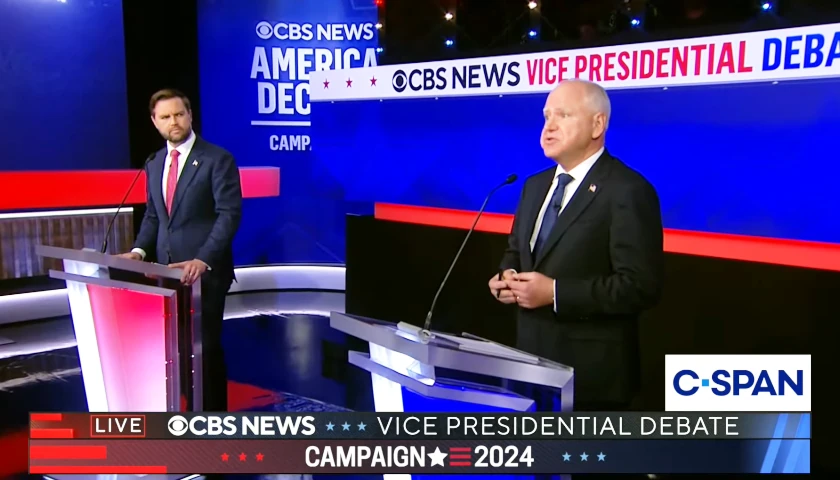Live from Music Row Tuesday morning on The Tennessee Star Report with Michael Patrick Leahy – broadcast on Nashville’s Talk Radio 98.3 and 1510 WLAC weekdays from 5:00 a.m. to 8:00 a.m. – host Leahy welcomed GOP primary winner for Division 9, Davidson County General Sessions Judge Brian Horowitz, in-studio to talk about the position and why he wears green.
Leahy: Here we are joined in-studio by Brian Horowitz. Brian is a candidate for judge here. You have the Republican nomination in the primary.
Horowitz: That is correct. We were successful on May 3rd and are now moving on to the general election on August 4th.
Leahy: Did you have any opposition in the primary?
Horowitz: We did not have any opposition in the primary, but I still like to say that we won.
Leahy: Yes, well, you did win. Tell us the position that you’re competing for.
Horowitz: I’m running for Davidson County General Sessions Judge, Division 9.
Leahy: Division 9. Were you elected or nominated to serve by residents of all of Davidson County or just a section thereof?
Horowitz: I will be elected by all of Davidson County. It’s not like a school board race or a council race where you’re only elected by your district. The race that I’m running in is a countywide race. And it’s important that we resonate with individuals in all parts of county.
Leahy: How many General Sessions Court judges are there in Davidson County?
Horowitz: There are 11.
Leahy: What does a General Sessions Court judge do?
Horowitz: If you’re asking my opinion, I think that it’s the most important judge in the courthouse. It is the people’s judge. General Sessions is incredibly important, and it touches the most lives of any courtroom downtown.
General Sessions has a civil component and a criminal component. The civil component deals with two things, mostly, and that is collections and small claims, up to $25,000, and evictions and detainer warrants, getting your stuff back. And that’s on the civil side.
And on the criminal side, it’s where most felonies start. And it’s a court where you’re able to adjudicate almost all misdemeanors, or all misdemeanors. And so it’s for petty crimes and the preliminary hearing stages of felonies and civil issues.
Leahy: What’s the difference between Circuit Court, General Session Court, and Chancellor Court?
Horowitz: Circuit Court, when you’re dealing on the criminal side, is a court of record. General Sessions is not a court of record.
Leahy: What does it mean if you’re a court of record?
Horowitz: For a court of record, what it means is there are a lot more formalities. You have all the rules of evidence, all the rules of criminal procedure, and you have all the pageantry that comes with it. That’s why General Sessions is so special, because it is the court of the people.
It’s a court where people often represent themselves. And that is why it’s very important that your sitting judge in General Sessions inform the people of their rights and inform the people of what they can and can’t do and the consequences of their actions because it’s where they represent themselves a tremendous amount of the time.
Leahy: So it’s sort of like the court where the smaller-type issues are resolved. Is that right?
Horowitz: Absolutely.
Leahy: Interesting. Tell us a little bit about Brian Horowitz. Just for our listening audience, Brian is attired in a kelly green sport coat. And so initially I’m thinking, is this St. Patrick’s Day?
Is your real name Brian O’Horowitz? Tell us a little bit about the kelly green look. Why does Brian Horowitz sport a kelly green sports jacket this morning?
Horowitz: So this jacket is something that’s very important to me. When I got out of law school, I knew that I wanted to hang a shingle, start my own practice, and help people. My name is tough to spell. It’s often misspelled and mispronounced.
And I knew that I had to do something to break through all the dark black and blue suits down at the courthouse. And so I had this old Wimbledon jacket, and I pulled it out and I said, you know what?
This thing is green, and I don’t know when and how to wear it. So I’m going to wear it down to the courthouse, and I’m going to start a practice taking appointments, helping people who cannot necessarily afford attorneys but have a constitutional right to one.
And the process to do that, you have to get in front of judges. You have to show them that you are capable and that you are willing, and they have to know that you’re there in order to appoint you.
And so I came in in this bright green jacket, and I said, here I am! And it also meant a whole lot of other things to me because green is an incredibly important color. Green means fresh, it means holistic, it means homegrown, it means growth, it means life.
And to me, as a criminal defense attorney, I represent all of those different elements when representing my clients. And so when my clients now show up to court, they may know my name, they may not be able to pronounce it, but they can always stand up and say, I’m represented by the guy in the green jacket.
The judges know exactly who they’re talking about, and it makes life easier for me and my clients. They can find me in the courthouse. My team always knows what I’m going to be wearing to an event.
Leahy: How many green jackets do you have?
Horowitz: I have three green jackets. I’m not the smelly guy in court. I do change them every day. However, I do wear the same uniform every single day because I give the same, which is 100 percent, every single day.
Leahy: Like the way Steve Jobs was famous because he always wore black. His entire wardrobe was black. Is your entire wardrobe green?
Horowitz: I think a better reference for Middle Tennessee would have been Johnny Cash, the Man in Black. But yes, it’s important to me. It’s one less thing I have to think of every day.
Leahy: When you first did the green-jacket thing, was it seen as sort of an affectation, as a little gimmick? How long did it take before it became something that actually was accepted down there?
Horowitz: I think in one county, I’m the green hornet. And in another county, I’m the green mullet.
Leahy: The green mullet?
Horowitz: The green mullet. Yes.
Leahy: The green mullet. I’m looking, it’s not exactly a mullet that you’re wearing, my friend. Was it at one point?
Horowitz: Oh, it is. And I know that my campaign manager said I need to get a haircut and I will this week. But no, I think at first …
Leahy: I mean, I’ve seen mullets. This is not exactly a mullet. (Horowitz chuckles)
Horowitz: I think if you saw it in the wind we’d be all right. (Laughter) But no, I think at first people didn’t know what to expect from it.
Leahy: Did the judges say “who is this guy in the green jacket?”
Horowitz: They definitely asked. But I think once they noticed that month after month, year after year, I kept wearing it. Now if I don’t wear it down to the courthouse, nobody recognizes me and they ask what happened?
Leahy: This is a very interesting beginning.
– – –
Tune in weekdays from 5:00 – 8:00 a.m. to The Tennessee Star Report with Michael Patrick Leahy on Talk Radio 98.3 FM WLAC 1510. Listen online at iHeart Radio.





